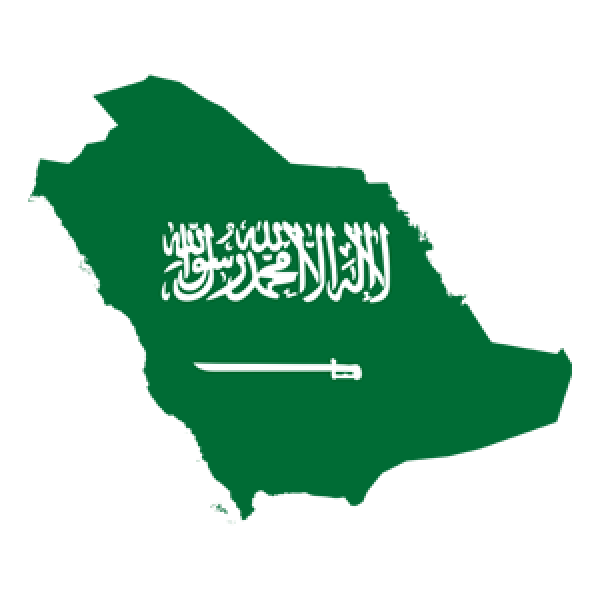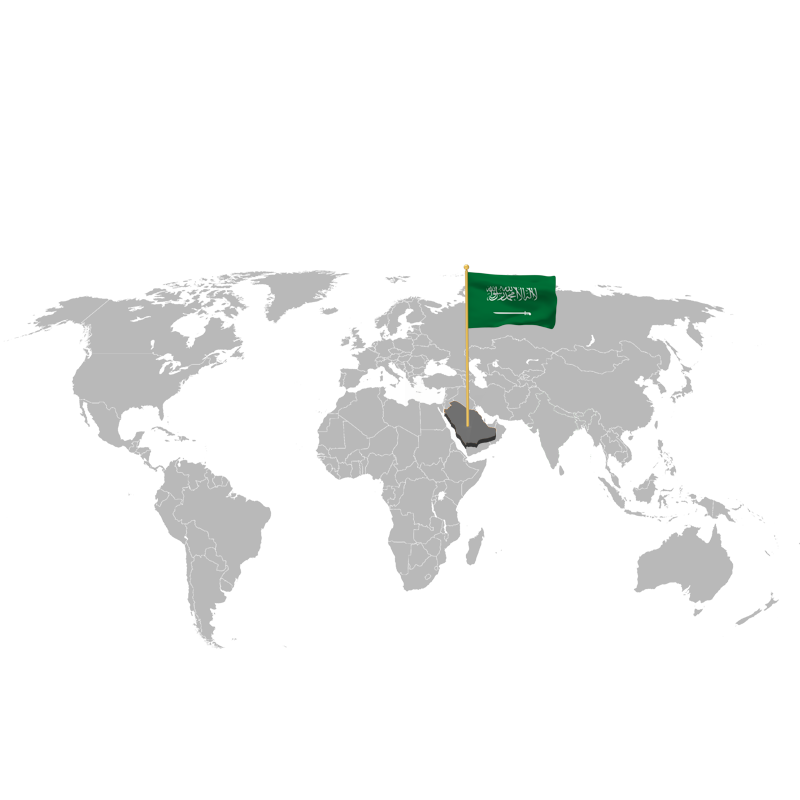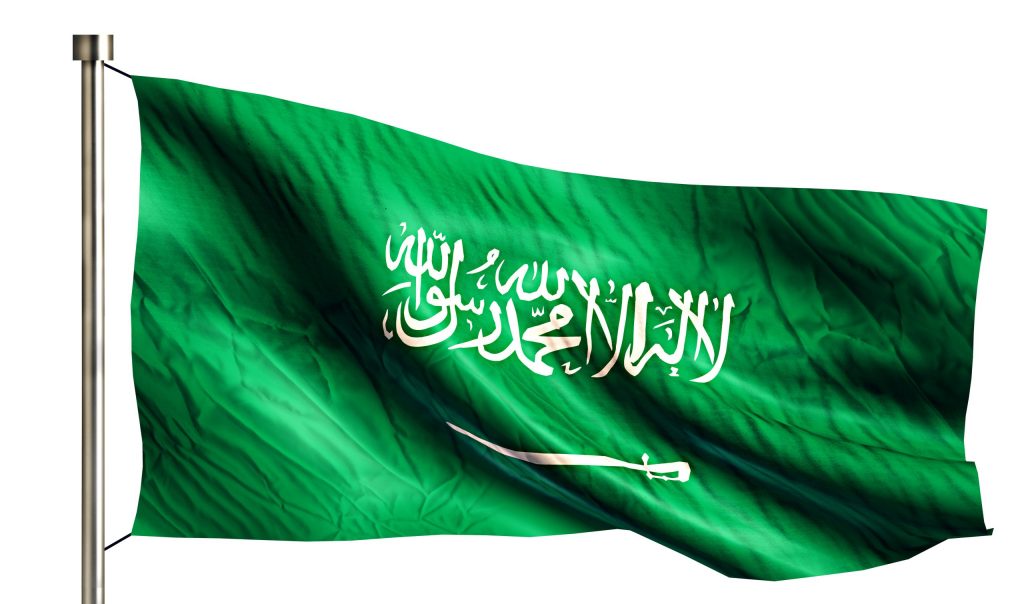Legamart Editorial
- April 1, 2020
We represent clients from all around the world in Saudi Arabia every year. We see the globe as having no borders and are unafraid of language hurdles or time zones.



Please give a brief description about what it is you need to talk to our lawyers about ?
Destination Saudi Arabia, a Nations Online country profile of the desert country in Arabia. The Kingdom of Saudi Arabia occupies most of the Arabian Peninsula, the original homeland of the Arabs, the place of origin of the Arabian language, and the historic center of Islam. Saudi Arabia is bounded by the Red Sea in the west and the Persian Gulf in the east. The country borders Iraq, Jordan, Kuwait, Oman, Qatar, United Arab Emirates, and Yemen. The country shares maritime borders with Bahrain, Egypt, Eritrea, Iran, and Sudan.
Saudi Arabia is the largest state in Western Asia with an area of more than 2 million km²; it is almost four times the size of Metropolitan France or somewhat larger than Mexico.
The sparsely inhabited country has a population of 34.8 million inhabitants (in 2020), the capital and largest city is Riyadh, the spoken language is Arabic. Saudi Arabia is a country with a predominantly Muslim population; the state religion is Wahhabism, the ultraconservative form of Sunni Islam. 85–95% of Saudi Arabian citizens are Sunni Muslims, 10–15% are Shia. The country is home to Mecca, Islam’s holiest city and the birthplace of the Prophet Muhammad. The kingdom is ruled by the house of Saud along traditional Islamic lines.
Saudi Arabia is the largest oil producer in the Middle East. The proven oil reserves in Saudi Arabia are the second largest in the world, estimated to be 266 billion barrels.
Saudi Arabia is famous for oil, to be the origin of Islam, Arabian horses, the world’s largest sand desert (Rub’ Al Khali), the world’s largest oasis (Al-Ahsa), Arabian coffee, oil, countless palaces, veiled women, countless mosques, Bedouins on horses, Bedouins on camels, Bedouins with falcons, sword-wielding dance moves, the holy cities of Mecca and Medina, oil, the Kaaba at the center of the al-Haram mosque. And, Saudi Arabia is the largest country in the world without a river.
Saudi Arabia, located in the Middle East between the Arabian Gulf and the Red Sea, is the birthplace of Islam and home to Islam’s two holiest shrines, in Makkah and Madinah. The modern Saudi state was founded in 1932 after a 30-year campaign to unify most of the Arabian Peninsula. Saudi Arabia is divided into 13 provinces, with Riyadh as the capital. The official language of Saudi Arabia is Arabic, and the currency is the Saudi riyal (SAR).

The country is a leading producer of oil and natural gas. The government continues to pursue economic reform and diversification, particularly since Saudi Arabia’s accession to the World Trade Organization (WTO) in December 2005, and promote foreign investment. A burgeoning population, aquifer depletion, and an economy largely dependent on petroleum output and prices are all ongoing governmental concerns.
Saudi Arabia possesses about 20% of the world’s proven petroleum reserves, ranks as the largest exporter of petroleum, and plays a leading role in the Organization of Petroleum Exporting Countries (OPEC).
In April 2016, Saudi Arabia introduced the Vision 2030 plan to reduce its dependence on oil, diversify the economy, and develop service sectors, such as health, education, infrastructure construction, recreation and tourism, and many more. The sweeping reforms outlined in the Vision 2030 and National Transformation Plan affect vast areas of the government, the economy, and citizens. Tax policy will play a significant role in these reforms as part of the government’s efforts to diversify revenues away from oil and address broader social and economic objectives while maintaining a fertile business environment and continuing to attract foreign direct investment (FDI).

One of the key targets of Vision 2030 is to increase FDI to 5.7% of gross domestic product (GDP) by 2030, from 3.8%. There is a large pool of research demonstrating the positive impact that double taxation treaties (DTTs) can have on FDI flows. Saudi Arabia should consider DTTs as a key way of attracting foreign firms into the Kingdom by offering them the reassurance that income will not be taxed twice. DTTs already prevail over domestic tax rules, and over 50 have been signed with countries including the United Kingdom, China, Switzerland, and Japan. The next step should be to focus on other key trading partners, particularly the United States, but also Germany and Australia.
Furthermore, Saudi Arabia is encouraging the growth of the private sector in order to diversify its economy and to employ more Saudi nationals. Diversification efforts are focusing on power generation, telecommunications, natural gas exploration, and petrochemical sectors. Roughly 10 million foreign workers play an important role in the Saudi economy, particularly in the oil and service sectors.

Merger control: The General Authority for Competition (GAC) must be notified 90 days before closing of the M&A transaction if it will result in an economic concentration. GAC has 90 days to provide a decision after it accepts the completed notification filing. The offer will lapse if GAC objects to the transaction. If no decision is reached after the 90 days, the transaction may proceed.
Foreign investment: Foreign ownership of private company shares in Saudi Arabia is subject to the Foreign Investment Law and regulated by the Ministry of Investment.
Sector-specific approvals: M&A transactions involving companies regulated by specific authorities will sometimes require approval from these authorities. For example, the Communication and Information Technology Commission issues specific regulations that regulate M&A transactions in the communication and IT sector.
The significant impact of this competition is highlighted in its effective contribution to improving the legal skills required by law students to plead before international arbitral tribunals and give them a full picture of what is required of them as practitioners, while encouraging them to study commercial international law and commercial arbitration and its legal frameworks.
The competition is divided into two basic stages: the first is written and includes writing legal memorandums on behalf of the claimant and the respondent in a case sent by the organizing committee to each team, the teams compete in this stage to qualify for the second stage which will includes oral arguments.
Yes, the target in a private M&A transaction may pay adviser costs.
There are currently no transfer taxes on either share purchase deals or asset purchase deals.
Customary representations and warranties include:
capacity and authority;
title to the shares;
audited and management accounts;
records;
business since the last accounts date;
assets;
debtors;
intellectual property;
confidential information;
contracts;
joint ventures, partnerships and corporate structure;
data protection and privacy;
litigation and disputes;
compliance and regulatory matters;
competition;
insurance;
employees and sponsorship;
pensions;
real estate; and
tax.
Breach of a representation or warranty constitutes a breach of contract, which will generally entitle the other party to claim damages.
The preparatory stages will usually involve legal advisers, financial advisers and tax advisers to cover the due diligence of the target. Other advisers may also be involved, depending on the nature of the target’s business.
In public M&A transactions, the bidder and the target must appoint:
an independent financial adviser, authorised by the CMA; and
an independent legal adviser, authorised to practise law in Saudi Arabia.
M&A transactions in Saudi Arabia may be financed through a mix of equity and debt, subject to the satisfaction of minimum capital and reserve requirements.
Limitations to liabilities may include:
matters fairly disclosed to the buyer or within its actual knowledge;
caps on liability amounts;
materiality thresholds;
a de minimis threshold per claim;
an aggregate threshold for all claims; and
time limits for bringing claims.
What is the International Youth Arbitration Arabic Moot (IYAAM)?
An annual competition for commercial arbitration aimed at developing the capacity of Arab law students (at all levels) to understand the latest developments in the field of international commercial law and train them to deal with arbitration as one of the most important means of settling commercial disputes worldwide.
Ministry of Commerce: M&A transactions are regulated by the Ministry of Commerce. The closing of M&A transactions will be through the Ministry of Commerce, ending with the issue of the amended commercial registration of the company.
Ministry of Investment: Foreign ownership of private company shares in Saudi Arabia is subject to the Foreign Investment Law and regulated by the Ministry of Investment. Before proceeding with M&A transactions involving foreign shareholdings in a private company, an investment licence must be issued or amended by the Ministry of Investment.
Capital Market Authority (CMA): Public M&A transactions are regulated by the CMA.
General Authority for Competition (GAC): The GAC may reject an M&A transaction if it results in an economic concentration.
No. Pre-sale vendor legal due diligence is not common in Saudi Arabia.
The M&A Regulations permit payment of a break fee if an acquisition offer fails because of specific events that prevent it from proceeding, such as where the board of the target recommends a higher competing offer.
The break fee must not exceed 1% of the offer value and must be disclosed in the offer document and the announcement, as required under the M&A Regulations. The board of the target must provide the Capital Market Authority (CMA) with written confirmation that the fee is in the best interests of the target shareholders.
The following public searches are carried out as part of the due diligence process:
commercial registration verification searches through the Ministry of Commerce website;
constitutional corporate documents verification searches through the Ministry of commerce e-magazine (Aamaly) website; real estate title verification searches through the Ministry of Justice (Notary Public) website; and in respect of public M&As, public announcements and information about the target on the Capital Market Authority website.
(a) Commercial/corporate, (b) Financial, (c) Litigation, (d) Tax, (e) Employment, (f) Intellectual property and IT, (g) Data protection, (h) Cybersecurity and (i) Real estate.
(a) Commercial/corporate
The due diligence request should include:
constitutional documents;
registrations;
licences;
the articles of association; and
the bylaws.
A search of the Ministry of Commerce website by the target’s commercial registration number and its expiry date will verify the company’s corporate status.
The bidder should also take steps to understand the target’s material contracts, based on a commercial assessment of its business.
(b) Financial
Limited liability companies and joint stock companies must prepare, audit and file with the authorities the audited financial statements. Reviewing these financial statements can provide the prospective buyer with high-level preliminary information about the target’s historical financial performance.
(c) Litigation
Legal due diligence covers any pending or actual litigation concerning the target.
(d) Tax
Tax due diligence is normally carried out as part of the financial due diligence on the target.
Companies in Saudi Arabia, other than listed companies, and with some other exceptions, are subject to two different tax regimes based on the nationality of their shareholders. Companies that are 100% owned by Saudi or Gulf Cooperation Council (GCC) shareholders are subject to the Zakat regime. Companies that are 100% owned by foreign (non-Saudi and non-GCC) shareholders are subject to the income tax regime.
Companies that are owned by Saudi or GCC shareholders and foreign shareholders are subject to the Zakat regime in proportion to the Saudi or GCC shareholding and the income tax regime in proportion to the foreign shareholding.
(e) Employment
Legal due diligence covers the review of employment policies and contracts. The review will examine matters relating to:
the transfer of employees and employee sponsorship;
liabilities relating to end-of-service benefits;
social security registration and compliance; and
‘Saudisation’ requirements.
The Labour Law regulates the treatment of employment contracts in the case of an M&A transaction. In the post-M&A transaction phase, the transfer of employees should be handled efficiently to avoid any regulatory implications.
(f) Intellectual property and IT
The due diligence usually covers:
IP registrations;
IP litigation; and
IT policies.
(g) Data protection
The bidder should take steps to conduct due diligence on the target’s compliance with applicable data protection laws. Saudi Arabia issued its first data protection law – the Personal Data Protection Law – in 2021, to regulate the collection and processing of personal data. The law applies to any personal data processing carried out by a ‘controller’, which is any entity that determines the purpose of processing personal data and how it is processed, regardless of whether the data processing is initiated by it or through any processer that processes data on its behalf.
(h) Cybersecurity
The due diligence may include technical reviews of cybersecurity.
(i) Real estate
Real estate due diligence should ascertain the extent of owned and leased real estate assets that the target relies upon to carry out its business. The review usually covers:
title deeds of the real estate owned by the target;
lease agreements between the target and third parties;
identification of any liens, mortgages, encumbrances or third-party interests; and
any real estate litigation.
Compulsory forms of insurance in Saudi Arabia
Motor insurance. Already one of the biggest insurance markets in Saudi Arabia, motor insurance is predicted to grow in the coming years. …
Health insurance. …
Social insurance. …
Share purchase deals are more common for their simplicity and continuity of the company’s business without the need to obtain or amend permits or licences related to its business activities. They also do not require the transfer of employees’ sponsorship or the amendment of employment contracts.
The main advantage of an asset purchase deal is that it enables the buyer to choose which assets and liabilities to acquire. In a share purchase deal, the acquirer not only acquires an interest in the target, but also inherits its liabilities. A share purchase deal thus demands more involved and detailed due diligence.
The parties will usually sign a term sheet or a letter of intent. The term sheet or letter of intent will be legally non-binding, except for some provisions such as confidentiality or non-disclosure provisions and exclusivity provisions. Some parties may choose to enter into an independent non-disclosure agreement before signing the term sheet or letter of intent.
The choice of the M&A transaction can be influenced by many factors, including:
tax considerations;
foreign investment restrictions considerations;
employment considerations;
IP considerations;
merger control considerations;
other regulatory considerations; and
the nature of the company and the nature of its business.
Private M&A transactions: Most private M&A transactions in Saudi Arabia are structured as share purchase deals. Through a share purchase agreement, the share capital of the target is acquired by the buyer from the seller for an agreed consideration.
A joint venture between two or more corporate entities through a contractual arrangement is also a common structure of private acquisition transactions.
Private M&A transactions may be also structured as asset purchase deals. Through an asset purchase agreement, all or certain assets and liabilities of the target are acquired by the buyer from the seller. For example, a buyer may acquire a specific factory owned by the seller.
Public M&A transactions: Public M&A transactions are regulated by the Capital Market Authority (CMA). The M&A Regulations issued by the CMA govern the transactions. Most public M&A transactions are structured as share purchase deals. The M&A Regulations apply to any public or private purchase or sale of voting shares in a listed company resulting in ownership or control of 10% or more of the voting shares of that company.